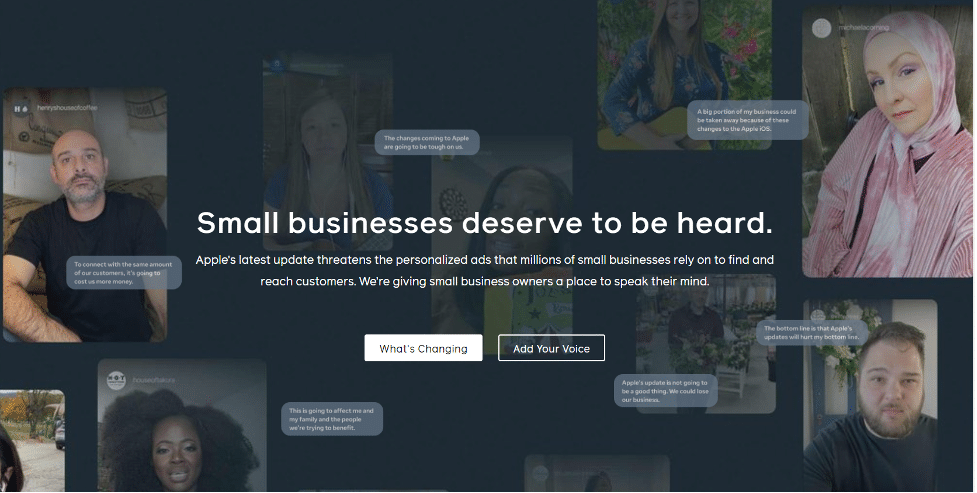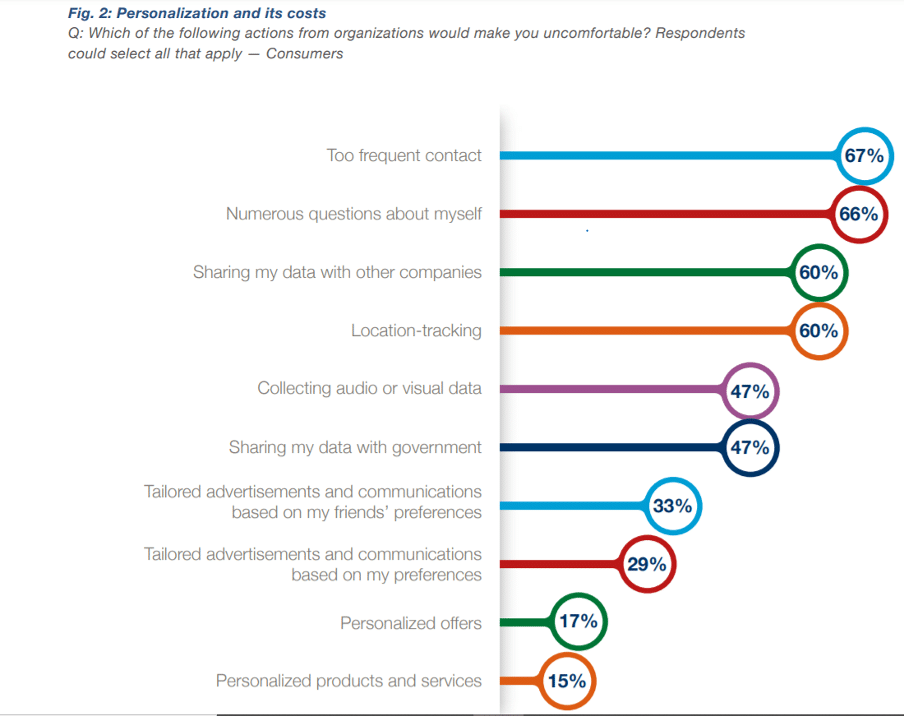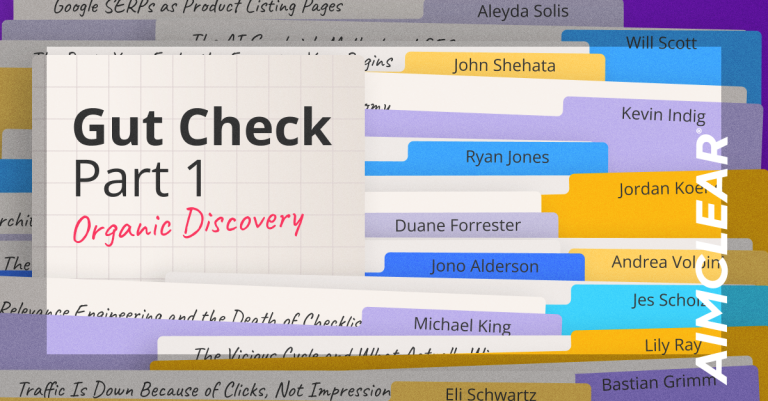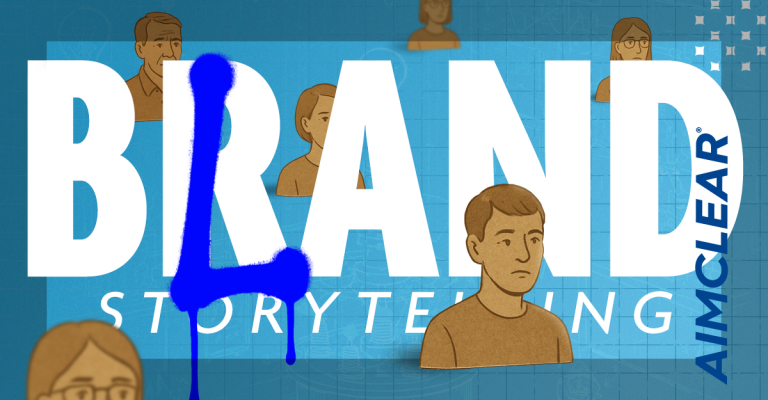Apple has announced iOS 14 changes, leading to much speculation about its impact on the ways marketers collect and process Facebook conversion tracking, including the use of the Facebook pixel. Apple will now require that all App Store offerings show iOS 14 device users a prompt (which Facebook PR brands as “discouraging”) in compliance with Apple’s AppTrackingTransparency (ATT) framework. ATT means apps must request authorization to access app-related data for tracking the user or the device. In other words, iOS device users may opt-in to tracking when prompted. If declined, various data collection and sharing will be prohibited.
[TL;DR shortcut! If you are reading this blog post to simply ascertain the next steps with your Facebook Ads campaigns in response to this massive shift, skim to the bottom of this post. We offer two sets of recommendations below. First, we make technical recommendations to implement Facebook’s Aggregated Event Measurement to maximize your usage of Facebook Ads in iOS 14. We also offer a zoomed-out integrated marketing perspective which may just set your mind at ease. Yes, this is a tectonic shift. No, ultimately the Apple/Facebook war will not matter much, and things are the same as they ever were.]
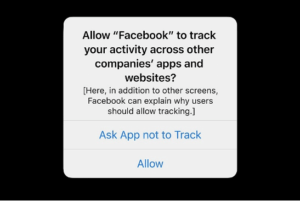
To be clear, Apple is not banning Facebook data collection as we know it. Rather, Apple is offering consumers a choice to be tracked or not.
“Users should know when their data is being collected and shared across other apps and websites ” and they should have the choice to allow that or not,” Apple
Many marketers believe a huge amount of iOS 14 users will decline to be tracked. Apple’s shift, implemented in the name of privacy and data transparency, will serve to render Facebook Ads targeting, optimization, mobile apps marketing, web and app conversion event reporting less effective or semi-useless.
As more iOS 14 device users decline to be tracked, ads personalization and performance reporting will be significantly limited for the app and web conversion events. Marketers may see a substantial decrease in conversions reported. Some ads may be paused or even stop delivering to iOS devices. An AppsFlyer survey notes 56 percent of marketers indicated campaigns will be hurt by the iOS 14 update. Nineteen percent of advertisers are very likely to shift ad spending within mobile, and 33 percent are somewhat likely to reduce mobile ad spend.
Apple controls ~15% of the smartphone market globally, but its market share in developed countries is much higher. Apple controls almost half the U.S. and Japanese markets. In Europe, it holds about one-third. These markets produce much higher revenue-per-user averages for Facebook (and Google) than other emergent markets. Revenue could drop once Apple lets its users opt-out of the tracking that powers personalized ads.
Facebook has responded to Apple’s changes. For technical marketers, Facebook announced Aggregated Event Measurement (AEM) “to support measurement of web events from iOS 14 users once Apple requires the ATT prompt. It is designed to help you measure campaign performance in a way that is consistent with consumers’ decisions about their data.” AEM is a protocol of Facebook domain verification, conversion event limits, value optimization, usage of Ads Manager, Ads Reporting, Ads Insights API, Apple’s SKAdNetwork window for iOS conversions, and other implementations. Developed by Apple, the SKAdNetwork API measures marketing campaigns results while users retain privacy.
Facebook contends Aggregated Event Measurement can support the privacy requirements of Apple and the needs of marketers. At the same time, Facebook acknowledges Apple’s changes will have a negative effect on many of Facebook’s business advertising customers. One can reasonably predict that the negative effects may spill over into Facebook’s corporate revenue.
Facebook’s vice president for ads and business products, Dan Levy, castigated Apple by claiming Apple’s true motivation is profit. Levy said, “We believe Apple is behaving anti-competitively by using their control of the App Store to benefit their bottom line at the expense of app developers and small businesses.” Facebook also launched a PR website and bought full-page newspaper ads to rally support.
“We disagree with Apple’s approach, yet we have no choice but to show their prompt,” said Facebook. “If we don’t, we’ll face retaliation from Apple, which could only further harm the businesses we want to support. We can’t take that risk.”
iOS 14/Facebook Ads Technical Expectations, Recommendations, & Next Steps.
Here is what marketers can expect and actions to consider.
- Conversions may be delayed. Be conservative and allow approximately three days after each week concludes to register conversions after ad impressions. Prepare your stakeholders to expect this timeframe and more generalized data.
- Top-of-funnel precision targeting, retargeting, and exclusion audiences may be much smaller.
- You may only designate eight conversion events per domain. If you do not take action to limit conversion events to eight, Facebook will set priorities for you and disable conversion events left enabled. The good news is that eight will be enough for many advertisers.
- There will be no more support for segmenting impressions and conversion by platform, gender, or age.
- Custom Audiences, lookalike audiences, and other first-party data techniques won’t work.
- You’ll be forced to choose a new attribution model. Our friend Tim Mayer suggests using Facebook’s Comparing Windows tool to better understand how various attribution windows play:
- 1-day click
- 7-day click (default)
- 1-day click and 1-day view
- 7-day click and 1-day view
[The following language is compiled from Facebook advisory documents.] If you plan to deliver ads for conversion events that occur on your business’s website.
- You may need to verify your website’s domain to help avoid any future disruption of your website campaigns. Domain verification must be done for the effective top-level domain plus one (eTLD+1). For example, for www.books.jasper.co.uk, books.jasper.co.uk, and jasper.co.uk the eTLD+1 domain is jasper.co.uk. This can help ensure that your domain verification will encompass all variations.
Domain verification should be prioritized for domains with pixels used by multiple businesses or personal ad accounts. This will enable you to configure pixel conversion events when Aggregated Event Measurement becomes available. - Learn more about how to use Facebook Pixel to reach devices on iOS 14 and measure performance.
If you plan to deliver ads for conversion events that occur in your business’s app:
- Update to Facebook’s SDK for iOS 14 version 8.1to help personalize ads delivered to devices on iOS 14, and continue to receive app conversion events reporting from iOS 14 devices. You can do this from the Events Manager. You’ll need to be an app admin to do so. Facebook’s SDK for iOS 14 version 8.1, currently supports Apple’s SKAdNetwork API and enables measurement for app install ads. If you don’t have the SDK installed, you may want to install it.
- Learn more about how to Use the Facebook SDK, App Events API, and Mobile Measurement Partners to reach devices on iOS 14and measure performance.
If you optimize, target, or report on mobile and desktop web events from Facebook pixel or any of Facebook’s other business tools, you can take steps to prepare your event setup and management for these changes.
- Plan to operate with 8 conversion events per domain. You’ll be restricted to configuring up to 8 unique conversion events per website domain, and ad sets optimizing for a conversion event that’s no longer available will be paused when Facebook implements Apple’s AppTrackingTransparency framework. Businesses that use more than 8 conversion events per domain for optimization or reporting should create an action plan for how to operate with 8 events maximum.
- Initial configuration and how to change it. Facebook will initially configure the conversion events they believe are the most relevant to your business based on your activity. All other events will be made inactive for campaign optimization and reporting. You can edit your conversion event selection in Facebook Events Manager when Facebook implements Apple’s AppTrackingTransparency framework. Facebook recommends that you identify the 8 conversion events most important to critical business outcomes and assess if changes need to be made to your campaign or measurement strategy. You may need to consider if you’ll be required to optimize for upper-funnel objectives like landing page views and link clicks. When you create your ad set you’ll choose only one of the 8 designated conversion events to optimize for.
- Complete domain verification. Facebook recommends that you verify your website domain. All businesses should verify their domain as a best practice. However, it’s important to prioritize verifying your domains if your domains have multiple businesses or personal ad accounts that own pixels. Please note that domain verification is not a new process and businesses can complete it from their Business Manager. The key difference is that domain verification needs to be done at the effective top-level domain plus one (eTLD+1), but the process is otherwise the same. Learn more about domain verification.
Zoomed Out Integrated Marketing Perspective
All of this said, consider zooming out and taking a more anthropological perspective. Marketing channels have changed over and over (and will continue to do so). The last 10 years were a blip in history, during which the speed of capabilities to gather and exploit unregulated personal data outpaced society’s awareness and technologies to safeguard privacy. History will look back on the era we have just lived as an aberration, the “wild west” of data mining, and marketers may have gotten a bit spoiled by an unsustainable paradigm.
Accept that the age of full data visibility to mainstream marketers is over. The era of unrestricted personal data for marketing is essentially behind us, which should neither surprise nor deter marketers. The depreciation of highly personalized, persistent state marketing across non-partnered channels will decline further as cookies go away. Consider what is happening with Facebook as practice for the inevitable. The good news is marketers do not actually need the cross-channel data cornucopia users unwittingly gave up over the last decade.
Use Facebook Ads where they work. A substantial network still exists in which Facebook data targeting and retargeting will work just fine, not the least of which are Android and desktop. Do not minimize where and what we can still do with Facebook. Simply understand that marketers may likely be forced to surrender to Apple Ads, whatever they evolve to be or not.
Work within ecosystems and partnerships. Take advantage of targeting and tracking where they are available, within and between channels. Once cookies go away, there will be a much greater premium on staying inside single, integrated ecosystems, be it Android/Google, Apple/iPhones, and Facebook in limited environments where it is fully functional. Yeah, Apple’s ads platform is weak, but it’s where we’ll need to be for seamless iOS integration. The same goes for Amazon. Marketers will need to be flexible in thinking, nimble in Ad Ops, and choose channels with fluidity.
State of the art is what you do with what you have. Somehow, brands sold piles of goods and services long before the internet became mainstream. Marketers used the data they had and found more effective messages. Channels were used for what they were good for until they stopped working as before. No doubt, the path forward will feature much of the same. Be a multi-trick pony and fight the temptation to become fully dependent on any channel or method.
Plug into the power of branding via low-cost mass marketing. If personalized targeting wanes, consider mass marketing tactics. Depending on channel selection, it can be inexpensive to make entire swaths of the population aware of the goods and services you market. Branding works to drive awareness, direct traffic, and brand keyword search. Marketers who don’t need precision targeting won’t regret its demise.
Seek and capitalize on trade partnerships, cooperative marketing, and mutually beneficial sales tactics. Hotels partner with restaurants. Trucking companies partner with drivers’ education programs for recruitment. Marketing agencies build relationships with investment bankers to generate referrals. Cardiologists make referrals to ENT surgeons. These offline tactics are the bread and butter of many businesses’ sales and lead generation efforts. They are not so dependent on Apple’s relationship with Facebook Ads.
Optimize for opt-ins. Give users a reason to share their data. Oxford Economics worked with NTT DATA during the spring of 2018 to survey 500 executives and 5,000 consumers in 15 countries about their visions for a future shaped by data. Only 17 percent of users were opposed to personalized offers and 15 percent to personalized products and services. Many of our European marketer friends have been optimizing opt-in messages to get more users to accept cookies and personalization, often with good success.
As a general consideration, seek ways to gain user consent for tracking by offering personalization that excites them. Make tracking a feature as opposed to being a bug.
Above all, redefine tracking, inter-channel data usage, and reset expectations. Accept that measurement will not look the same as it did before. Find clever extrapolations of data we still can access. Seek third-party relationships with emergent vendors who have platform relationships and are trying to build a better mousetrap with the same data. Some of the brightest minds in the world will build new integrations of various stripes to solve for the duality of tracking and user privacy needs. Expect change and be channel-agnostic. Not to worry. We are marketers that use channels, not a Facebook that uses marketers.
Wondering how this will impact your marketing efforts? Reach out to us and we’d be happy to assist.
Additional Resources
Apple’s seismic change to the mobile ad industry is drawing near, and it’s rocking the ecosystem, CNBC.com, Megan Graham: Apple’s seismic change to the mobile ad industry is drawing near, and it’s rocking the ecosystem.
Impacts of iOS 14 Changes on Facebook Ads: What Should Advertisers Be Doing?, Heddle Marketing Blog, Tim Mayer: Our friend Tim sent this post to clients regarding the impacts of the IOS14 changes on Facebook advertising and what we on the ad side should do.
Facebook’s Tone-Deaf Attack on Apple, NYTimes.com, Kara Swisher: The company declared in newspaper ads that it was “standing up to Apple.” It’s a desperate ploy that’s unlikely to work.
4 Reasons to Side With Facebook in Its Privacy War With Apple, Inc.com, Amrita Khalid: Apple’s new operating system will give users control over which apps can track them online–potentially throttling ad targeting and all that use it. Facebook says small businesses could feel the pain the most.
Nice Try, Facebook. iOS Changes Aren’t Bad for Small Businesses, Wired.com, Dipayan Ghosh: The social media giant would have you believe that Apple’s privacy update will hurt the little guys. But Facebook’s motives aren’t so altruistic…
My Christmas Gift To You: Common-Sense Steps For Apple’s Data Privacy Protocol, MediaPost.com, Joe Mandese: Much coverage has already been devoted to Facebook’s advocacy campaign attacking Apple’s new consumer data privacy protocol, but it’s important to note that this is primarily about how people interface with media, and who controls that.

